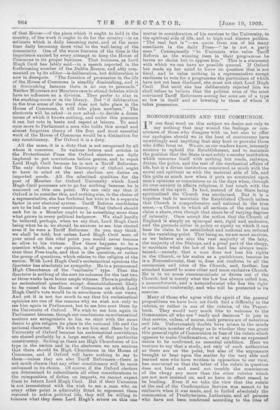NONCONFORMISTS AND THE COMMUNION.
IN our final word on this subject we desire not only to say nothing that may wound the feelings or con- sciences of those who disagree with us, but also to offer our apologies should we in the heat of controversy have unwittingly said anything that may hurt or provoke those who differ from us. We are, as our readers know, intensely anxious to uphold the Establishment, and to maintain the position that the State is not solely a secular institution which concerns itself with nothing but roads, railways, drains, the police, and the rest of the mechanical affairs of life, but is a divine institution concerned as much with the moral and spiritual as with the material side of life, and this quite as much now when it puts no constraint upon men's opinions or consciences as in the days when, through its over-anxiety in affairs religious, it lost touch with the matters of the spirit. In fact, instead of the State being spiritualised the Church was secularised. But it is a hopeless task to maintain the Established Church unless that Church is comprehensive and national in the true sense,—a Church in which all sections of the nation can claim a share, even though that share be of varying degrees of intensity. Once accept the notion that the Church of England is simply an episcopal sect, rigid and exclusive, and the grounds either in policy or equity on which it can base its claim to be established and national are reduced to the vanishing-point. That being so, we are most anxious, as we believe are also the vast majority of the laity, the majority of the Bishops, and a great part of the clergy, to maintain what the law of the land has always main- tained,—namely, that a man does not lose his rights in the Church, or his status as a parishioner, because he is a Nonconformist, that is, does not conform to all the ceremonies and rites of the Church, and, further, has attached himself to some other and more exclusive Church. He is in no souse excommunicate or driven out of the Church, but is merely what the law has always culled him,' a nonconformist,. and a nonconformist who has the right to occasional conformity, and who will be protected iu its exercise.
Many of those who agree with the spirit of the general propositions we have here set forth find a difficulty in the rubrics, or rather in one of the rubrics, of the Prayer- book. They would very much like to welcome to the Communion all who are " ready and desirous" to join in that service, unless, of course, such persons are of notorious evil life. Unfortunately doubts have arisen in the minds of a certain number of clergy as to whether they can grant this general right of Communion in face of the rubric which appears to make Confirmation, or at any rate an expressed desire to be confirmed, an essential condition. Here we venture to say that a study, not only of such authorities as there are on the point, but also of the arguments brought to bear upon the matter by the very able and learned men who have written. in opposition to our view, has convinced us that the letter of the rubric in question does not bind and need not trouble the consciences of the clergy any more than the other rubrics which are not now insisted on, and so have in effect ceased to be binding. Even if we take the view that the rubrics at the end of the Confirmation Service was meant to be exclusive when it was made, and to forbid absolutely the communion of Presbyterians, Lutherans, and all persons who have not been confirmed according to the rites of the Church of England, or of a Church possessing and recognising the Apostolic Succession—a view which, we May say incidentally, is, in our opinion, directly opposed to the history, meaning, and legal effect of that rubric— nevertheless we hold that the usage of the Church, and of the highest authorities in the Church, has been so con- sistently opposed to the carrying out of that rubric according to the letter that it must be considered as having ceased to bind. It must be regarded just in the same way as the rubric as to previous notice of the desire to com- municate, or as the Canon directing the repelling of such persons as the clergyman may deem to have " spoken against or depraved " the Royal Supremacy in " Causes Ecclesiastical." Again, the Confirmation rubric may be put on a par with the rubrics and statutes which forbid any alteration in the services set forth in the Prayer-book, -e-rubrics and legal provisions which are now held not to bind the clergy in their strict and literal sense.
The best proof that the usage of the Church has been to admit, and not to repel, persons who have not been confirmed either according to the rites of the Church of England or by some Bishop possessing the Apostolic Succession is to be found in the manner in which the foreign Princesses who have become Queens or Princesses here, or the Princes who have married into our Royal house and become British subjects, have been treated. From the time of the Reformation to the present day there have been scores of such marriages, and yet Con- firmation has never been required. Yet the majority of these Royal ladies and Princes have been members of the Lutheran Church, or of Churches like that in which her present Majesty the Queen was brought up,- i.e., Churches without the Apostolic Succession. We may note here that none of those who have taken the side opposed to us have ventured to meet this point, either directly or indirectly, so absolutely strong is it in enforcing our contention. From the point of view of those who insist upon the absolute bar of non-Confirmation the Queen and Prince Albert were, of course, exactly in the position of the humblest Nonconformist or Presbyterian. Unless, then, those who oppose our view are prepared to argue that there Is one law for Princesses and another for ordinary men and women—which, of course, they would not dream of doing—the usage of the Church in these conspicuous, and, as we may term them, national examples is conclusive. To put it in another way. Unless our opponents can show that there was something exceptional about the cases of Prince Albert and of the Queen, and of the other Royal personages we have referred to, which admittedly they cannot show, then the usage of the English Church to admit unconfirmed persons is established. In addition to the conclusive argument which can be drawn from the cases of the Queen and the Royal Princes and Princesses, usage has been established in hundreds of humbler examples. rill within the last forty or fifty years it would have been difficult indeed to find a clergyman who would have thought of refusing the Communion to Presby- terians or to Nonconformists merely on the ground that they had not been confirmed. Further, it may be argued that the statutes dealing with occasional conformity implicitly, if not expressly, gave statutory sanction to the usage. It is notorious that those who availed themselves of such Acts were unconfirmed persons. So strong was the usage on this point, and so little desire was there to insist upon the exclusion of unconfirmed persons, that we believe we are right in saying that a very considerable number of persons have become Bishops and Archbishops in the Church of England who were themselves never confirmed. We do not speak from certain knowledge, but we very much doubt whether Archbishop Tait, to mention only one recent case, was ever confirmed. No doubt his Ordination might be held to act as constructive Confirmation, but it Is hardly to be supposed that be did not receive the Communion in the Church of England until he was ordained.











































 Previous page
Previous page